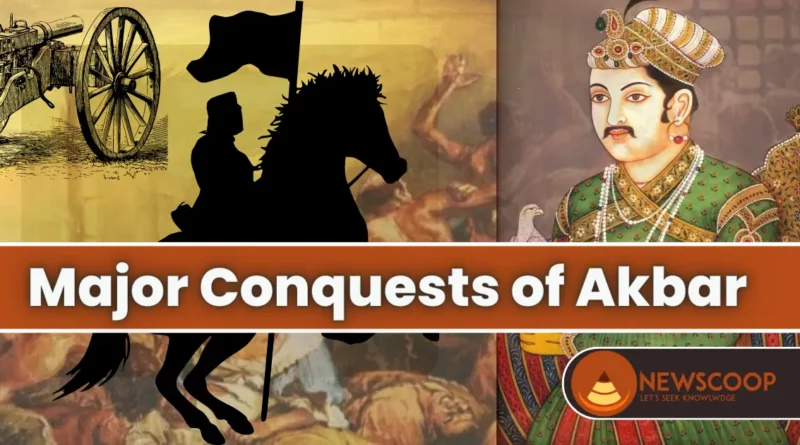Major Conquests of Akbar
In this article, we will delve into the legendary conquests of Akbar the Great, one of India’s most illustrious rulers. Known for his exceptional military strategy and tactics, Akbar expanded the Mughal Empire to new heights during his reign from 1556 to 1605.
Through his successful campaigns against various kingdoms and sultanates in northern and southern India, Akbar solidified Mughal rule over a vast portion of the Indian subcontinent.
This article will give readers a glimpse into Akbar’s conquests, exploring his tactics, victories, and the impact of his rule on the region and beyond. Join us as we uncover the rich legacy of this legendary ruler and his place in Indian history.”
Major Conquests of Akbar the Great
| Region/Kingdom | Year(s) | Outcome |
|---|---|---|
| Gujarat | 1572 | Defeated Sultan of Gujarat |
| Bengal | 1576 | Defeated Afghan ruler |
| Rajputana (Mewar) | 1583 | Defeated Rajput King of Mewar |
| Kandahar | 1595 | Captured city |
| Sindh | 1591 | Annexed region |
| Garhwal | 1597 | Conquered by force |
| Kabul | 1598 | Captured |
| Deccan | Late 1590s | Absorbed multiple kingdoms |
| Bundelkhand | 1600 | Conquered local ruler |
Introduction to the Conquests of Akbar
Akbar the Great was the third Mughal Emperor of India and ruled from 1556 to 1605. He is widely regarded as one of the greatest rulers in Indian history, known for his military conquests, administrative innovations, and cultural patronage.
Akbar’s military conquests expanded the Mughal Empire and solidified Mughal rule over a large portion of India.
Further, he was a brilliant military strategist and tactician, who successfully led several campaigns against various kingdoms and sultanates in northern and southern India.
Moreover, his conquests marked a significant turning point in Indian history and helped establish the Mughal Empire as one of the dominant powers in the Indian subcontinent.
Major Conquests of Akbar
Some of the notable conquests of Akbar the Great include:
- Gujarat
- Rajputana
- Deccan
- Bengal
- Kabul
- Sindh
- Kandahar
- Garhwal
- Bundelkhand
Conquest of Gujarat
- Akbar’s first major military conquest was the province of Gujrat in northwestern India.
- In 1572, Akbar led a campaign against the Sultan of Gujrat and defeated him.
- This conquest marked the beginning of Akbar’s expansion into northern India and established the Mughal Empire’s control over the region.
Conquest of Rajputana
- Rajputana, a group of kingdoms in northern India, posed a challenge to Mughal expansion.
- Akbar adopted a policy of diplomacy and matrimonial alliances with the Rajputs, eventually gaining their loyalty.
- In 1583, Akbar defeated the Rajput King of Mewar, solidifying Mughal control over the region.
Conquest of Deccan
- The Deccan plateau in southern India was ruled by various independent kingdoms and sultanates.
- Akbar led a series of military campaigns against these kingdoms and successfully absorbed them into the Mughal Empire.
- The conquest of the Deccan marked the Mughals’ southernmost expansion and further solidified Akbar’s rule over India.
Conquest of Bengal
- In 1576, Akbar led a successful campaign against the Afghan governor of Bengal, bringing the region under Mughal control.
Conquest of Sindh
- In 1591, Akbar defeated the ruler of Sindh and annexed the region into the Mughal Empire.
Conquest of Kabul
- In 1598, Akbar captured the city of Kabul, securing the northwestern frontier of the Mughal Empire.
Conquest of Kandahar
- In 1595, Akbar successfully captured the city of Kandahar, expanding the Mughal Empire’s influence in the region.
Conquest of Garhwal
- In 1597, Akbar defeated the ruler of Garhwal and absorbed the kingdom into the Mughal Empire.
Conquest of Bundelkhand
- In 1600, Akbar defeated the local ruler of Bundelkhand and brought the region under Mughal control.
Also Read: Religious Policy of Akbar
Conclusion
In conclusion, Akbar the Great was a visionary ruler who expanded the Mughal Empire through his military conquests. His campaigns against various kingdoms and sultanates in northern and southern India solidified Mughal rule over a large portion of the Indian subcontinent.
Akbar’s brilliant military strategy and tactics, combined with his administrative innovations and cultural patronage, established the Mughal Empire as one of the dominant powers in the region. He is widely regarded as one of the greatest rulers in Indian history and his legacy continues to be remembered and celebrated. Through his conquests, Akbar left a lasting impact on Indian history and shaped the future of the country for generations to come.
Thank You!

